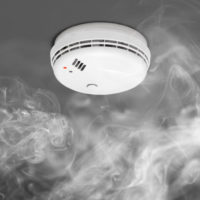Check Your Batteries: Smoke Detectors and Carbon Monoxide Alarms
November 13, 2019 Robert Adler, Acting Chairman of the Consumer Product Safety Commission (CPSC) is reminding Americans that now is the time for checking and changing batteries in their carbon monoxide and smoke detectors. In regard to limiting risks associated with fires and CO exposure, Adler said: “early warning is crucial to getting out […] alive” – and it is true. Make sure to check all alarm and detector batteries to best keep you and your loved ones safe – and take a look at some more of our tips below.
Robert Adler, Acting Chairman of the Consumer Product Safety Commission (CPSC) is reminding Americans that now is the time for checking and changing batteries in their carbon monoxide and smoke detectors. In regard to limiting risks associated with fires and CO exposure, Adler said: “early warning is crucial to getting out […] alive” – and it is true. Make sure to check all alarm and detector batteries to best keep you and your loved ones safe – and take a look at some more of our tips below.
Fatal House Fires and Carbon Monoxide Poisoning
According to the National Fire Protection Association, or NFPA, last year there was a house fire every eighty-seven seconds. The association also estimates that three out of every five deadly house fires happen in homes without working smoke alarms. As we know, fires are not the only avoidable tragedies that occur; the CPSC reports an average of 400 carbon monoxide-related deaths and 50,000 injuries each year.
Carbon monoxide is an odorless, colorless, and tasteless gas. Carbon monoxide detectors are designed to detect the presence of CO – and to sound an alarm when it is present. Although the warning signs of carbon monoxide poisoning can be subtle, they are important to know. Some common symptoms of CO poisoning are:
- Nausea or vomiting,
- Dizziness,
- Shortness of breath,
- Confusion,
- Dull headache,
- Weakness,
- Blurred vision, and:
- Loss of consciousness
If you suspect that you may be experiencing carbon monoxide poisoning, get into fresh air immediately and call 9-1-1.
Smoke Alarms and Carbon Monoxide Detectors
The CPSC recommends having a smoke alarm on every floor of the home, as well as outside and inside all sleeping areas. The same goes for carbon monoxide detectors, except they do not necessarily need to be installed inside bedrooms. The best and most effective way to ensure that smoke detectors and carbon monoxide alarms are functional is to check them monthly. Generally, batteries should be changed once every year. If an alarm has a ten-year battery, make sure to set a reminder for when the time comes.
If you have questions about whether a smoke alarm or carbon monoxide detector is working, you can always call the manufacturer. And remember, if you are experiencing issues with your alarm(s), you can also contact your local fire department’s non-emergency line for further assistance. Taking just a few minutes to check and change alarm batteries once a year can make the difference between life and death, so if you have not done it yet, now is the time.
Philadelphia Personal Injury Lawyers at Galfand Berger, LLP Representing Injured Individuals Since 1947
If you have a legal question or concern, please contact our Philadelphia personal injury attorneys at Galfand Berger. With offices located in Philadelphia, Bethlehem, Lancaster, and Reading we serve clients throughout Pennsylvania and New Jersey. To schedule a consultation, call us at 800-222-8792 or complete our online contact form.
 Google Screened
Google Screened
